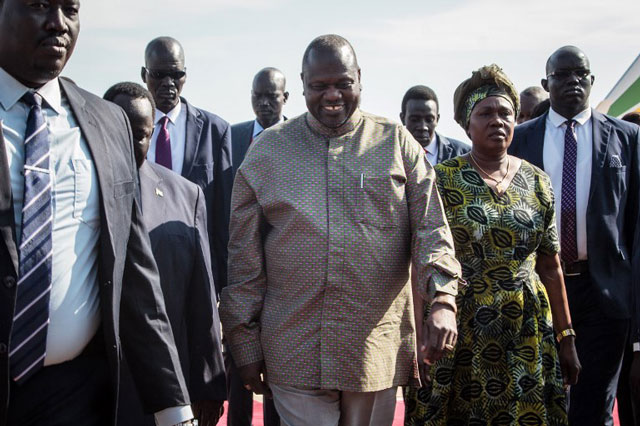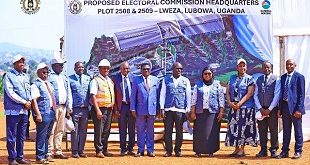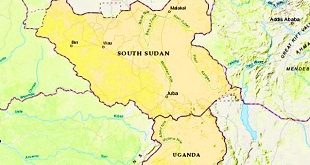
Juba, South Sudan | AFP | South Sudan rebel leader Riek Machar returned to the capital Juba for the first time in more than two years Wednesday, saying he arrived with a message of peace.
Machar, who under the terms of the September deal is to be reinstated as vice president, had not set foot in the city since he fled in July 2016 under a hail of gunfire when an earlier peace pact collapsed.
“Our message is one: We are for peace…. This peace is in our hearts and we are going to implement this agreement,” Machar said at a ceremony to welcome the latest peace accord for the war-ravaged country.
The new deal aims to end a civil war that erupted in the world’s youngest country in December 2013 and uprooted about four million people — roughly a third of the population.
The rebel chief was welcomed at Juba’s airport by President Salva Kiir, Machar’s former ally turned bitter enemy.
The two rivals then joined regional leaders at the ceremony to publicly welcome the most recent agreement, signed under international pressure on September 12 in the Ethiopian capital Addis Ababa.
“I want to reiterate in front of you that the war in South Sudan has come to an end,” Kiir said, according to UN radio Miraya, repeating words often heard but not followed through.
In a goodwill gesture, the president announced the release Wednesday of former rebel spokesman James Gatdet Dak, to be followed Thursday by the freeing of William John Endley, a retired South African colonel and ex-adviser to Machar.
Both men were sentenced to death by a Juba court in January.
Rebel Leader Riek Machar landed at Juba International Airport after two years in Exile @ReutersAfrica pic.twitter.com/rK74IQwn3F
— Denis Dumo (@DenisDumo) October 31, 2018
.@KagutaMuseveni has arrived in the South Sudan Capital Juba for the country’s Peace Celebration Day #PeaceInSouthSudan pic.twitter.com/9NXWEdBm4J
— Nabusayi L. Wamboka (@lindahNabusayi) October 31, 2018
Updates: The President of Somalia ?? have landed in Juba @ReutersAfrica
— Denis Dumo (@DenisDumo) October 31, 2018
update: Sudanese President Bashir have also arrived in Juba @ReutersAfrica
— Denis Dumo (@DenisDumo) October 31, 2018
UN Mission in South Sudan (UNMISS) chief David Shearer hailed the moment of cooperation and said in a statement that building trust would be crucial.
“To see parties that have previously been divided by violence coming together here in Juba, in a public sign of unity, sends a strong message to the citizens of this country that you are genuinely committed to end the suffering and build durable peace,” he said.
– ‘Chance to restore hope’ –
Several thousand people gathered for the ceremony at the John Garang Mausoleum, built in honour of the independence hero killed in a helicopter crash in 2005.
Among regional leaders attending were Sudanese President Omar al-Bashir, Ethiopia’s newly appointed President Sahle-Work Zewde, Somalia’s head of state Mohamed Abdullahi Mohamed and Ugandan President Yoweri Museveni.
South Sudan gained independence from its northern neighbour Sudan in 2011 after a 22-year civil war pitting rebel groups against Khartoum.
“Sadly, the hopes and dreams of that moment were lost in the outbreak of the war that has plagued this country for five long years,” Shearer said.
“This ceremony is a chance for the leaders here today to restore that hope and to secure a peaceful and prosperous future for their people.”
The deal has encountered delays on several issues including the reactivation of a joint committee on borders and the number of regional states.
It was not known how long Machar would remain in Juba, as his aides have expressed concern for his safety in the city.
Lam Paul Gabriel, a spokesman for Machar’s SPLM-IO rebel group, said Tuesday Machar would be accompanied by about 30 political figures.
“We are worried for his security in Juba, but the truth is here: we are for peace, and what we are trying to do is build trust. So that is why he is able to leave his forces behind and just go with politicians,” Gabriel said.
The long South Sudan conflict has had a huge effect on trade and people at large, for our country specifically, export revenue to South Sudan reduced by $500m, while at least a million South Sudanese sought refuge in Uganda.
— Yoweri K Museveni (@KagutaMuseveni) October 31, 2018
I believe with this peace process, the refugees can return home and participate in rebuilding their country. pic.twitter.com/OYX5QLR4LA
— Yoweri K Museveni (@KagutaMuseveni) October 31, 2018
– Deep humanitarian crisis –
South Sudan’s civil war erupted when Kiir, a member of the Dinka tribe, accused his then deputy Machar, a Nuer, of plotting a coup.
The conflict split the country along ethnic lines and has seen mass rape, the forced recruitment of child soldiers and attacks on civilians.
It has caused one of the world’s greatest humanitarian crises and wrecked the economy in a nation which relies on oil production for the bulk of its revenues.
Machar fled Juba in July 2016 after fierce fighting erupted between government forces and his rebels, killing several hundred people.
He headed on foot to the Democratic Republic of Congo, and went into exile in South Africa.
Several ceasefire agreements and peace pacts have failed to end the fighting, which has killed an estimated 380,000 people, uprooted a third of the population, forced nearly two-and-a-half million into exile, and triggered bouts of deadly famine.
 The Independent Uganda: You get the Truth we Pay the Price
The Independent Uganda: You get the Truth we Pay the Price



